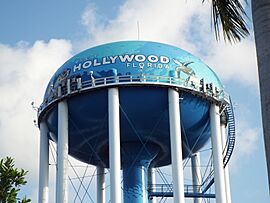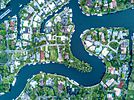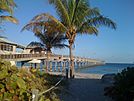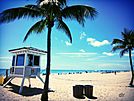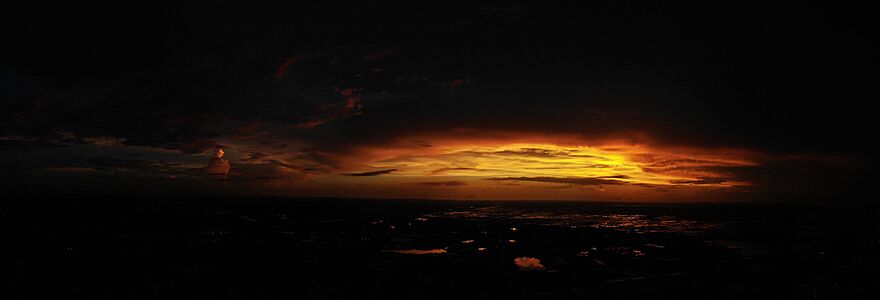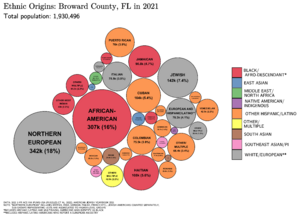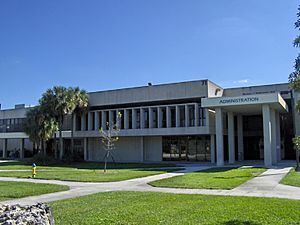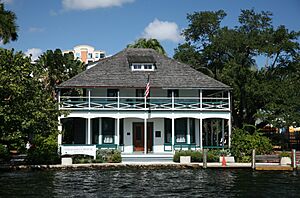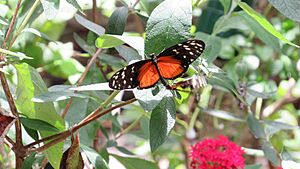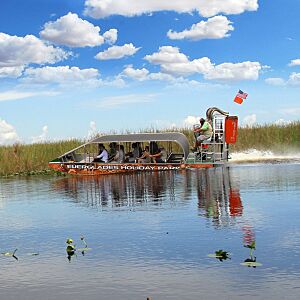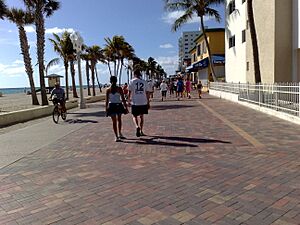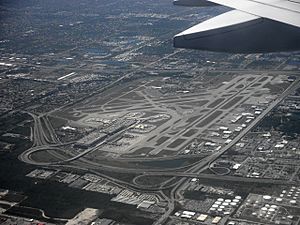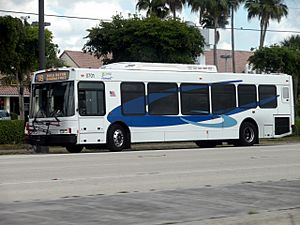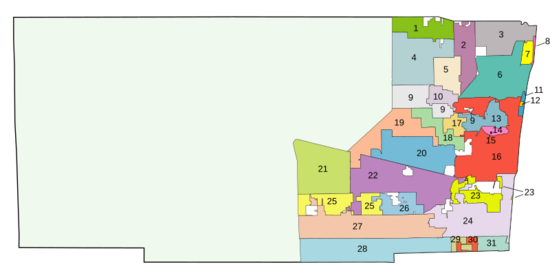Broward County, Florida facts for kids
Quick facts for kids
Broward County
|
|||
|---|---|---|---|
|
Images, from top down, left to right: Fort Lauderdale skyline; Hollywood water tower; Tarpon River neighborhood; Dania Beach pier; lifeguard station on Las Olas Beach; Sawgrass Mills shopping mall in Sunrise; Amerant Bank Arena; docked boats in Pompano Beach
|
|||
|
|||
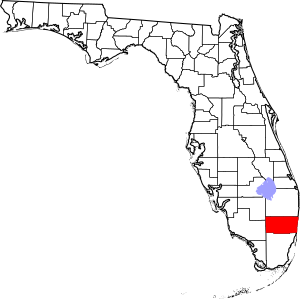 |
|||
| Country | |||
| State | |||
| Region | South Florida | ||
| Metro area | Miami | ||
| Founded | April 30, 1915 | ||
| Named for | Napoleon B. Broward | ||
| County seat | Fort Lauderdale | ||
| Largest city | Fort Lauderdale (population, total area) Davie (land area) |
||
| Incorporated cities | 24 | ||
| Government | |||
| • Type | Council–manager government | ||
| • Body | Board of County Commissioners | ||
| Area | |||
| • Total | 1,322.817 sq mi (3,426.08 km2) | ||
| • Land | 1,203.105 sq mi (3,116.03 km2) | ||
| • Water | 119.712 sq mi (310.05 km2) | ||
| Highest elevation | 29 ft (9 m) | ||
| Lowest elevation | 0 ft (0 m) | ||
| Population | |||
| • Estimate
(2023)
|
1,962,531 |
||
| • Rank | 17th in the United States 2nd in Florida |
||
| GDP | |||
| • Total | $146.735 billion (2022) | ||
| Time zone | UTC−5 (Eastern Time Zone) | ||
| • Summer (DST) | UTC−4 (Eastern Daylight Time) | ||
| ZIP Codes |
33004, 33009, 33019–33021,33023–33029, 33060, 33062–33069, 33071, 33073, 33076, 33301, 33304–33306, 33308–33317, 33319, 33321–33328, 33330–33332, 33334, 33351, 33441–33442
|
||
| Area codes | 754/954 | ||
| FIPS code | 12011 | ||
| GNIS feature ID | 295753 | ||
| Primary airport | Fort Lauderdale–Hollywood International Airport FLL (major/international) |
||
| Secondary airport | Miami International Airport- MIA (international/neighboring county)- Palm Beach International Airport- PBI (international/neighboring county)- North Perry Airport- HWO (regional)- Fort Lauderdale Executive Airport- FXE (regional)- Pompano Beach Airpark- PMP (regional) |
||
| Interstates | |||
| U.S. Routes | |||
| State roads | |||
| Commuter rail | Amtrak, Brightline, Tri-Rail | ||
Broward County is a county in Florida, United States. It is part of the larger Miami metropolitan area. Broward County is the second most populated county in Florida. It is also the 17th most populated county in the entire United States. In 2020, about 1.9 million people lived here.
The main city and county seat is Fort Lauderdale. In 2020, Fort Lauderdale had over 182,000 residents. Broward County is known for being very diverse, with people from many different backgrounds. Its economy is also strong, ranking as the second largest in Florida.
Contents
History of Broward County
Who were the first people in Broward County?
The first people to live in the Miami area, which includes Broward County, arrived about 12,000 years ago. These early Native American groups settled along the Miami River.
When Europeans first arrived, the Tequesta people lived here. They controlled a large area of southeastern Florida. The Tequesta were skilled at fishing, hunting, and gathering food from plants. They did not farm. They are also known for creating the Miami Circle, a special archaeological site.
How was Broward County founded?
Broward County was officially created on April 30, 1915. It was first planned to be called Everglades County. However, a leader named Ion Farris suggested naming it after Napoleon Bonaparte Broward. He was the governor of Florida from 1905 to 1909.
Governor Broward strongly supported draining parts of the Everglades. He wanted to turn this swampy land into "useful land" for farming and building. This effort helped open up much of what is now Broward County for development. Before the county was founded, towns like Dania (1904), Pompano (1908), and Fort Lauderdale (1911) were already growing.
In 1915, land from both Palm Beach and Miami-Dade counties was used to form Broward County. Soon after, the county began to grow rapidly. The first tourist hotel in Fort Lauderdale opened in 1919. Developers also started to create new island communities by dredging wetlands.
When did Broward County grow quickly?
By 1925, Broward County was experiencing a huge growth spurt. However, a major hurricane in 1926 caused a slowdown in the economy. After World War II, the county saw another big increase in population and development. It changed from mostly farmland to a busy urban area.
In 1967, the city of Coconut Creek was officially formed. The county's population growth slowed down in 1974 due to a national economic downturn. Still, Broward County had grown from about 84,000 people in 1950 to over 620,000 by 1970.
What happened in recent Broward County history?
In 1975, the Broward County government got its official structure. Around the same time, the Seminole Tribe of Florida began to organize businesses. These businesses, like cigarette sales and bingo, would later bring in a lot of money. In 1976, the major highway Interstate 95 was finished through Broward County.
A rare event happened on January 19, 1977: snow fell in South Florida for the first time ever! People saw snow as far south as Miami Beach. By 1980, the population of Broward County had grown to over 1 million people.
In 1992, Hurricane Andrew passed through Broward County. It caused a lot of damage and left many people without homes. By the year 2000, the population reached over 1.6 million. Also, the town of Southwest Ranches was formed.
In 2005, West Park became the 31st city in Broward County. Later that year, Hurricane Wilma hit South Florida. It caused widespread damage and power outages. Wilma was the strongest storm to hit Broward County since 1950.
In 2018, a sad event occurred at Stoneman Douglas High School in Parkland. A former student caused a tragic shooting. The person responsible was later sentenced to life in prison. In 2020, some residents suggested renaming the county. This was because Governor Broward had supported policies that separated people by race.
Geography and Nature
| Weather chart for Broward County, FL | |||||||||||||||||||||||||||||||||||||||||||||||
|---|---|---|---|---|---|---|---|---|---|---|---|---|---|---|---|---|---|---|---|---|---|---|---|---|---|---|---|---|---|---|---|---|---|---|---|---|---|---|---|---|---|---|---|---|---|---|---|
| J | F | M | A | M | J | J | A | S | O | N | D | ||||||||||||||||||||||||||||||||||||
|
2.7
75
56
|
2.6
77
58
|
3.7
80
61
|
2.9
83
64
|
4.3
87
69
|
8.6
90
73
|
6.9
91
74
|
7.7
91
74
|
7.9
90
74
|
5.1
86
70
|
3.4
81
65
|
2.2
77
59
|
||||||||||||||||||||||||||||||||||||
| temperatures in °F precipitation totals in inches |
|||||||||||||||||||||||||||||||||||||||||||||||
|
Metric conversion
|
|||||||||||||||||||||||||||||||||||||||||||||||
Broward County covers about 1,323 square miles. Most of this area, about 1,210 square miles, is land. The rest, about 113 square miles, is water. The county is very flat, with an average height of only 6 feet above sea level.
The eastern part of Broward County is mostly built up with cities and towns. This urban area is next to the Atlantic Ocean on one side. On the other side, it borders the Everglades Wildlife Management Area. This means there isn't much undeveloped land left.
Broward County is also home to an artificial reef called Osborne Reef. It was made from tires off the coast of Fort Lauderdale. However, this project has caused environmental problems.
Which counties are next to Broward County?
- Palm Beach County - to the north
- Miami-Dade County - to the south
- Collier County - to the west
- Hendry County - to the northwest
People and Diversity
| Historical population | |||
|---|---|---|---|
| Census | Pop. | %± | |
| 1920 | 5,135 | — | |
| 1930 | 20,094 | 291.3% | |
| 1940 | 39,794 | 98.0% | |
| 1950 | 83,933 | 110.9% | |
| 1960 | 333,946 | 297.9% | |
| 1970 | 620,100 | 85.7% | |
| 1980 | 1,018,200 | 64.2% | |
| 1990 | 1,255,488 | 23.3% | |
| 2000 | 1,623,018 | 29.3% | |
| 2010 | 1,748,066 | 7.7% | |
| 2020 | 1,944,375 | 11.2% | |
| 2023 (est.) | 1,962,531 | 12.3% | |
| U.S. Decennial Census 1920–1970 1980 1990 2000 2010 2020 2022 |
|||
Broward County is a very diverse place. Many different cultures and languages are spoken here. While English is the most common language, a large number of people also speak Spanish or French/Haitian Creole.
The county has a growing number of people who were born in other countries. Many come from places like Jamaica, Haiti, Colombia, and Cuba. This mix of people makes Broward County a vibrant and interesting place to live.
Economy and Jobs
Broward County has a strong economy. Many businesses have their main offices here. For example, Spirit Airlines moved its headquarters to Dania Beach in 2024. Before that, it was in Miramar for many years. Silver Airways also has its main office near the Fort Lauderdale–Hollywood International Airport.
The biggest part of agriculture in Broward County is plant nurseries and greenhouses. These businesses grow plants, flowers, and sod (grass) for landscaping and gardens.
Education in Broward County
Schools for all ages
Broward County Public Schools is the main school district. It is one of the largest school districts in the United States. It is also the second largest in Florida.
There are several colleges and universities in Broward County:
- Broward College
- Florida Atlantic University (with branch campuses)
- Nova Southeastern University
- Keiser University
Other places offer adult education and technical training:
- DeVry University
- University of Phoenix
- The Art Institute of Fort Lauderdale
- Florida Career College
- Atlantic Technical Center and Technical High School
- McFatter Technical College and Technical High School
- Sheridan Technical College and Technical High School
Public libraries and resources
The Broward County Library system is one of the biggest in the country. It has 38 different library locations. There are also five smaller public libraries that are not part of the main system.
Broward County libraries offer many free resources. For high school students, they have programs to help with college readiness and SAT/ACT test preparation. Adults can take free computer classes. You can also buy bus passes at most libraries. The library also has many apps you can download to access resources on your phone or tablet. These include apps for music, movies, e-books, magazines, and language learning.
Fun Places to Visit

Museums and history
- African-American Research Library and Cultural Center, Fort Lauderdale
- Bonnet House Museum & Gardens, Fort Lauderdale
- Coral Springs Museum of Art, Coral Springs
- Fort Lauderdale Antique Car Museum, Fort Lauderdale
- Fort Lauderdale History Center, Fort Lauderdale
- Naval Air Station Fort Lauderdale Museum, Fort Lauderdale
- NSU Art Museum, Fort Lauderdale
- Plantation Historical Museum, Plantation
- Stranahan House, Fort Lauderdale
- The International Game Fish Association, with the Fishing Hall of Fame & Museum, Dania Beach
- The International Swimming Hall of Fame, Fort Lauderdale
- The Museum of Discovery and Science, Fort Lauderdale
- Wiener Museum of Decorative Arts, Dania Beach
- Young at Art Museum, Davie
Nature and wildlife parks
- Anne Kolb Nature Center, Hollywood
- Butterfly World, a beautiful botanical garden in Coconut Creek
- Everglades Holiday Park, where you can take airboat rides and see alligator shows
- Fern Forest Nature Center, Coconut Creek
- Flamingo Gardens, a botanical garden and wildlife sanctuary
- Secret Woods Nature Center, Dania Beach
- Sawgrass Recreation Park
Other attractions and activities
- Beach Place, a lively area with shops and restaurants near the beach in Fort Lauderdale
- Broward Center for the Performing Arts, for shows and performances
- Hollywood Beach Broadwalk, a popular beachfront promenade
- Florida Grand Opera
- Fort Lauderdale Swap Shop, a huge indoor flea market
- Sawgrass Mills, a very large outlet shopping mall in Sunrise
- Amerant Bank Arena in Sunrise, home to the NHL's Florida Panthers hockey team
- The Festival Flea Market Mall in Pompano Beach, one of America's largest indoor flea markets
- Riverside Hotel, Fort Lauderdale's oldest hotel
- Riverwalk (Fort Lauderdale), a scenic path along the New River
With 23 miles of beaches, Broward County is also a great place for scuba diving, snorkeling, and enjoying the ocean. Many young people visit during Spring break.
Getting Around Broward County
Airports
Fort Lauderdale–Hollywood International Airport (FLL) is the main airport for Broward County. It is located near Fort Lauderdale, Hollywood, and Dania Beach. The airport is close to the cruise ship terminals at Port Everglades. It is a popular airport for tourists traveling to the Caribbean. FLL is one of the busiest airports in the United States and a major international gateway.
Other airports in the county include:
- North Perry Airport
- Fort Lauderdale Executive Airport
- Pompano Beach Airpark
- Downtown Fort Lauderdale Heliport
Public transportation
- Broward County Transit operates public buses throughout the county.
- Sun Trolley offers smaller, local transportation services.
Major roads
 Interstate 95
Interstate 95 Interstate 75
Interstate 75 Interstate 595 (Port Everglades Expressway)
Interstate 595 (Port Everglades Expressway) Florida's Turnpike (SR 91)
Florida's Turnpike (SR 91) Homestead Extension (SR 821)
Homestead Extension (SR 821) State Road 869 (Sawgrass Expressway)
State Road 869 (Sawgrass Expressway)
Trains
- Passenger trains: Amtrak, Brightline, and Tri-Rail
- Freight trains: Florida East Coast Railway and CSX Transportation
Greenways System
A system of recreational trails is being built in Broward County. These trails will connect different cities and interesting places.
Cities and Towns in Broward County
Broward County has many different cities, towns, and villages. Here are some of the main ones, with their populations from the 2020 US Census:
| # | Community Name | Type | Population (2020) |
|---|---|---|---|
| 1 | Parkland | City | 34,670 |
| 2 | Coconut Creek | City | 57,833 |
| 3 | Deerfield Beach | City | 86,859 |
| 4 | Coral Springs | City | 134,394 |
| 5 | Margate | City | 58,712 |
| 6 | Pompano Beach | City | 112,046 |
| 7 | Lighthouse Point | City | 10,486 |
| 8 | Hillsboro Beach | Town | 1,987 |
| 9 | Tamarac | City | 71,897 |
| 10 | North Lauderdale | City | 44,794 |
| 11 | Lauderdale-by-the-Sea | Town | 6,198 |
| 12 | Sea Ranch Lakes | Village | 540 |
| 13 | Oakland Park | City | 44,229 |
| 14 | Wilton Manors | City | 11,426 |
| 15 | Lazy Lake | Village | 33 |
| 16 | Fort Lauderdale | City | 182,760 |
| 17 | Lauderdale Lakes | City | 35,954 |
| 18 | Lauderhill | City | 74,482 |
| 19 | Sunrise | City | 97,335 |
| 20 | Plantation | City | 91,750 |
| 21 | Weston | City | 68,107 |
| 22 | Davie | Town | 105,691 |
| 23 | Dania Beach | City | 31,723 |
| 24 | Hollywood | City | 153,067 |
| 25 | Southwest Ranches | Town | 7,607 |
| 26 | Cooper City | City | 34,401 |
| 27 | Pembroke Pines | City | 171,178 |
| 28 | Miramar | City | 134,721 |
| 29 | West Park | City | 15,130 |
| 30 | Pembroke Park | Town | 6,260 |
| 31 | Hallandale Beach | City | 41,217 |
Images for kids
See also
 In Spanish: Condado de Broward para niños
In Spanish: Condado de Broward para niños
 | James Van Der Zee |
 | Alma Thomas |
 | Ellis Wilson |
 | Margaret Taylor-Burroughs |



